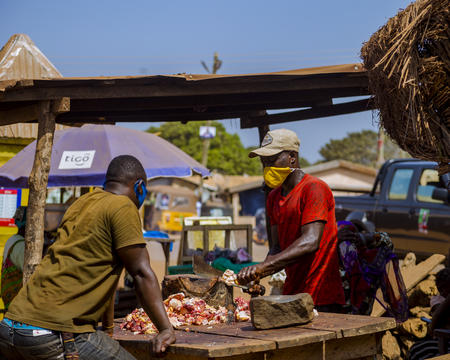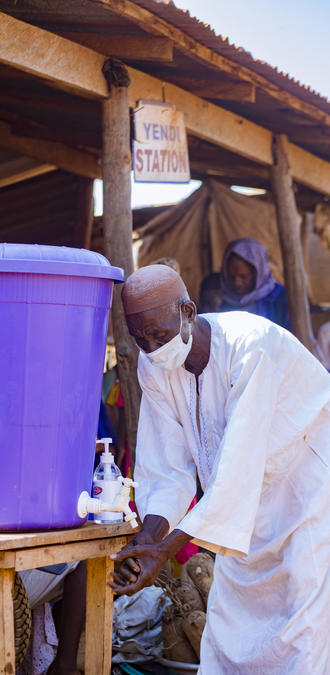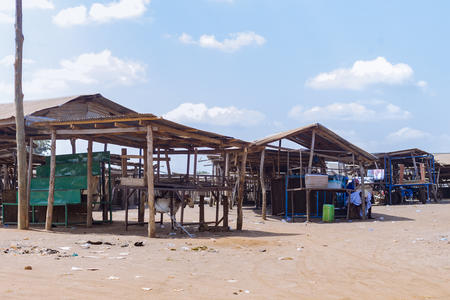Water, sanitation and hygiene in public places must be improved to support economic development

During the COVID-19 pandemic, many informal workers have had to keep their businesses open, despite often lacking the services and facilities they need to stay hygienic and safe. David Aidoo describes the challenges people working in Ghana's public places have faced, why supporting this sector matters to the country, and how WaterAid Ghana is working to address the gaps in hygiene services.
Clean water, decent sanitation and good hygiene services are fundamental to economic development. They can facilitate business development, especially in the informal sector, which contributes significantly to economic growth and development in many developing countries.
In 2019 Ghana’s GDP was US $67 billion, to which the informal sector, composing more than 33 informal professions and types of artisan, contributed around 27%. Around 90% of registered businesses are in the informal sector. Many economic activities, particularly in this sector, are carried out in public places, local markets and lorry stations, by farmers, traders, artisans and others.
Ghana’s COVID-19 response in markets
Despite their critical role in the economy, and the surge of the COVID-19 pandemic, transport stations and marketplaces continue to lack sustainable handwashing facilities and other essential personal protective equipment (PPE) that would support safe, continuous economic activity by enabling people to adhere strictly to safety protocols. The powers to construct and manage these local markets belong to the authority of the Metropolitan, Municipal, and District Assemblies (MMDAs) as part of their function to promote local economic development.
After Ghana recorded its first COVID-19 case in March 2020, the Government set out five key objectives to combat the pandemic:
- Limit and stop the importation of the virus.
- Contain its spread.
- Provide adequate care for the sick.
- Limit the impact of the virus on social and economic life.
- Inspire the expansion of our domestic capability and deepen our self-reliance.
This led to the Government introducing partial lockdown in Greater Accra, Kasoa and Greater Kumasi, where citizens’ movements were restricted to use of essential services. Public places like local markets, health centres and lorry stations were the few areas that continued to operate.
Lockdown in Ghana’s markets
To ensure citizens adhered to World Health Organization (WHO) and Ghana Health Service safety protocols, and avoid them travelling long distances to markets, the MMDAs mandated to implement the COVID-19 management strategy in their respective assemblies set up ‘satellite’ markets in and around their cities.
Before the COVID-19 pandemic, provision of water, sanitation and hygiene (WASH) services in public places had not been prioritised, especially markets and lorry stations. During the pandemic, the Government distributed thousands of veronica buckets to the satellite markets to support people to practise hand hygiene at critical times. These, among other temporary measures introduced by the Government, and supported by various institutions and civil society organisations, helped to manage and contain the virus. But they were neither built sustainably nor maintained, resulting in them breaking down, leaving people again unable to follow COVID-19 hygiene protocols.
Making good hand hygiene a new normal
In an address to the nation before the pandemic, President Akufo-Addo advocated the need for citizens to continuously practise hand hygiene as a new normal. This simple behaviour can save lives, cutting diarrhoea by almost half and acute respiratory infections by nearly a quarter.
Handwashing with soap affects not just health and nutrition, but also education, economics, and equity. Yet the WHO/UNICEF JMP 2019 report states that three billion people globally lack the facilities to practise basic handwashing at home, and that in Ghana 59% of people are unable to practise hand hygiene at all critical times (PDF).
As the pandemic broke, it became clear that, beyond this daily value, handwashing with soap was among the most effective and inexpensive ways to prevent COVID-19, as reported by the Global Handwashing Partnership. Handwashing became a health priority. Yet, having been unevenly addressed, more work was required.
Addressing the gaps in WASH services in Ghana’s public spaces
WaterAid Ghana, in support of Government-led initiatives to fight the spread of COVID-19, has rolled out a project in partnership with the Mastercard Foundation to promote the WHO five core hygiene behaviours, particularly hand hygiene, in 15 markets. Called Safety of Markets and Pre-Empting Stigmatization of COVID-19 Survivors: An Integrated Hygiene Behaviour Change Campaign, it is being implemented in three regions.
As part of implementation, we completed a survey to understand the various gaps, particularly in WASH, that prevent market operators (traders, drivers, head porters, bus conductors) and customers from practising hand hygiene at all critical times.
The results suggest the Government, through the MMDAs, did a good job in promoting hand hygiene in the country’s local markets during the pandemic. This included distribution of veronica buckets, identifying people to be responsible for filling the buckets with water, and providing the markets with soap. They showed that MMDAs have also been promoting the need to wash hands at all critical times, among other protocols, broadcasting through information systems in public places such as markets and lorry stations.
The survey also identified gaps in the WASH status of our markets that impact on the practice of handwashing, which policy and decision makers at all levels must prioritise to help make public places, particularly markets and lorry stations, safe for business operators and customers. This is critical now that the Government is easing restrictions.
Many local markets have several entry points, requiring handwashing facilities to be placed at all points for market operators and customers to easily access them and wash their hands. And, while veronica buckets were a crucial emergency solution, they are not durable or effective long term, relying on market operators to monitor and fill them, often by walking long distances to a water source. This has led to several instances of people willing to wash their hands not being able to do so.
Additionally, the buckets supplied are not disability-friendly, which goes against the constitution, specifically the Persons With Disability Act, 2006 Act 715. This makes it impossible for people to follow the President’s call to continuously practise hand hygiene at all critical times, particularly when in public places like markets and lorry stations.
Strengthening the informal sector with safe WASH
Keeping our markets safe through provision of adequate WASH facilities would substantially support strengthening and improving the informal sector, which contributes significantly to the economy in terms of productivity and job opportunities for Ghana's workforce. Studies have shown that washing hands at all critical times is one of the best ways to prevent the spread of common and life-threatening infections, including COVID-19. If market operators were able to access sustainable handwashing facilities, and practise other WHO-recommended protocols, they would have a better chance of staying healthy, which would help them to continue to operate effectively and support the economy.
As such, it is imperative that the Government, through the MMDAs, as a matter of urgency addresses the WASH inadequacies and gaps in public places by providing more permanent, sustainable handwashing facilities; providing or rehabilitating water systems; and intensifying hygiene campaigns. This would go a long way towards making our markets and lorry stations safe, and supporting our valuable informal sector – during the pandemic and beyond.
David Aidoo is the Grants Manager for WaterAid Ghana and currently covering the Programme funding and partnerships portfolio for the Country Programme. A version of this blog first appeared in print and on the B&FT Online.
Top image: Women stack yams and carry produce at Bimbila Market in the Nanumba North Municipal Assembly, Ghana.






